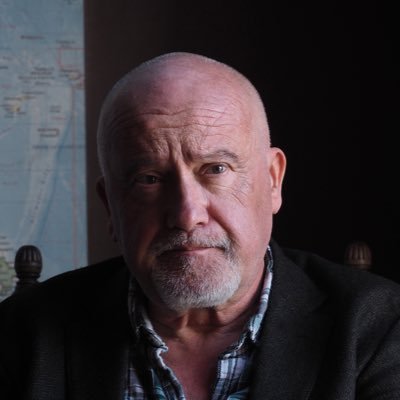For thirty years Colonel Sir Michael and Lady (Aileen) McCorkell kept a secret. On June 20, 1972, their home – Ballyarnett, just outside Derry – had hosted the first meeting between representatives of the British Government and the Provisional IRA on June 20, 1972. While others waited outside Frank Steel, Dáithí Ó Conaill, P. J. Woodfield and Gerry Adams explored the possibility of a ceasefire in the McCorkells’ front room. Discussions, without which, there may never have been a Good Friday Agreement as we know it. Recently, through the British Red Cross heritage project, “Our Stories – Our Times”, the role of the Red Cross movement in Northern Ireland’s peace process is being examined for the first time.
In December 2002, the McCorkells received a call informing them that they were to be mentioned in the upcoming release of State Papers, did they have any comment on the meeting at Ballyarnett? Sir Michael wrote a brief statement: ‘[our] home was chosen because it was near the border … and [for] who my wife was, head of the Red Cross organisation … respected by both sides of the community.’ Aileen consulted her own contemporary notes of the meeting, she remembered meeting the young men and she recalled baking a chocolate cake.
My mother was the first to say, ‘Call me Aileen’. Her Morris Minor criss-crossed from the Waterside to the Bogside, often laden with the day’s “Meals on Wheels”, transporting casualties of violence, and offering help to those in need, but always with a Red Cross in the window.
David McCorkell, second son of Michael and Aileen, has recently been in conversation with the British Red Cross, kindly opening the family’s papers and recounting the work of both his parents, especially that of his mother. The story of this meeting has been told before, but current research is highlighting the role of Aileen and the Red Cross in the earliest stages of the peace process.
The British Government held Michael in its esteem for his military service and leadership which, undisclosed, continued even in 1972, and according to Aileen’s papers it was John Hume of the SDLP who had specifically endorsed her suitability to Secretary of State Whitelaw. Aileen’s respect had been earnt on the streets of Derry through her dedication to the fundamental principles of the Red Cross movement: humanity, neutrality, impartiality, independence, voluntary service, unity and universality. She always said the Red Cross is neutral even in Northern Ireland.
‘Ever since the start of the riots in Derry … I felt the Red Cross has a part to play, but that role never became clear to me until the morning of Tuesday, 13th August 1969’ wrote Aileen. That morning she learnt that the unfolding civil unrest, the Battle of the Bogside, had disrupted the regular Meals on Wheels service delivered by the Red Cross. Aileen bought eighteen tins of soup, gathered up biscuits, and, armed with a can opener, half a dozen blankets, and a first aid kit she collected a colleague in her Morris Minor 1000 and set off for the Bogside. Aileen drove around barricades, negotiated with masked men carry ‘sticks and clubs’ amongst other, hidden weapons, and she spoke frankly to British authority about the independence and impartiality of the Red Cross. She did not imagine, from the outset, that this could possibly become a regular occurrence; yet for the members of the Derry Branch of the British Red Cross it did.
Founded in 1961 the Derry Branch, later the Western Branch before amalgamation, was immediately led by Aileen McCorkell after a local ex-councillor had criticised its proposed formation. Meals on Wheels, Thursday Club, the Trolley Service at Altnagelvin Hospital, these were just a handful of its regular peacetime services to the elderly, the infirm, and the needy of Derry. When Derry itself became a conflict zone the Red Cross offered additional services and support: it shared a First Aid Post in the Creggan (established by the Order of Malta), distributed clothes and supplies to families burnt out of their homes from the Strand Road, and provided the evacuations and transportation of civilian casualties on both sides of the community.
Not everything came easily. Aileen’s papers recall members of the Red Cross who quietly left the organisation, threatening letters that were received, the harassment of volunteers and even the short lived theft of her car. Despite it all, Aileen recorded plainly ‘our [regular] services remained uninterrupted’ and summarised her own views:
To remain neutral is very very difficult when you hear and see things that are totally opposed to what you have been brought up to believe in. As a Red Cross member, you must remain impartial and relieve suffering. To create confidence, you must be trusted and we decided at that time that all we sought and heard we would keep to ourselves.
Lady McCorkell was a remarkable woman. Her dedication to the fundamental principles of the Red Cross movement and her commitment to the people of Derry vitally earnt her the respect of both communities. Without that respect, coupled with the work of her husband, there may never have been a fateful opportunity on 20 June 1972, to start a conversation, over a chocolate cake, that led, in part, to the Good Friday Agreement we mark the 25th anniversary of today.
* David McCorkell is the Lord Lieutenant of County Antrim. The “Our Stories – Our Times” project is led by the British Red Cross and made possible by a grant from the National Lottery Heritage Fund.
This is a guest slot to give a platform for new writers either as a one off, or a prelude to becoming part of the regular Slugger team.
Discover more from Slugger O'Toole
Subscribe to get the latest posts to your email.

